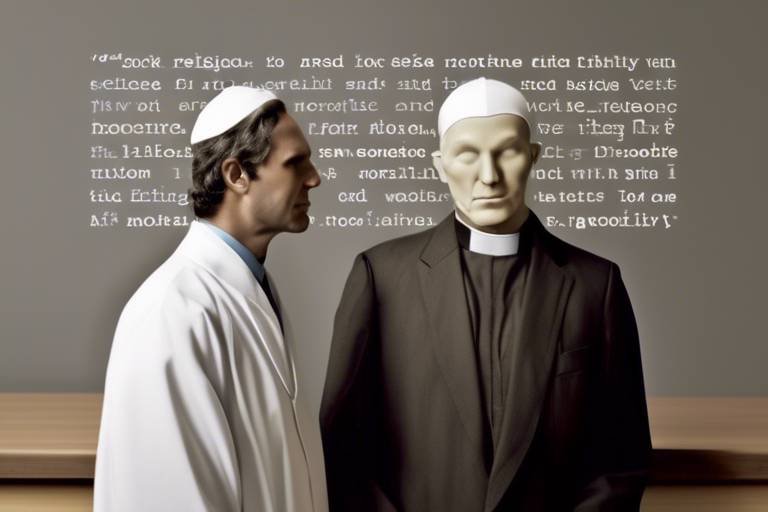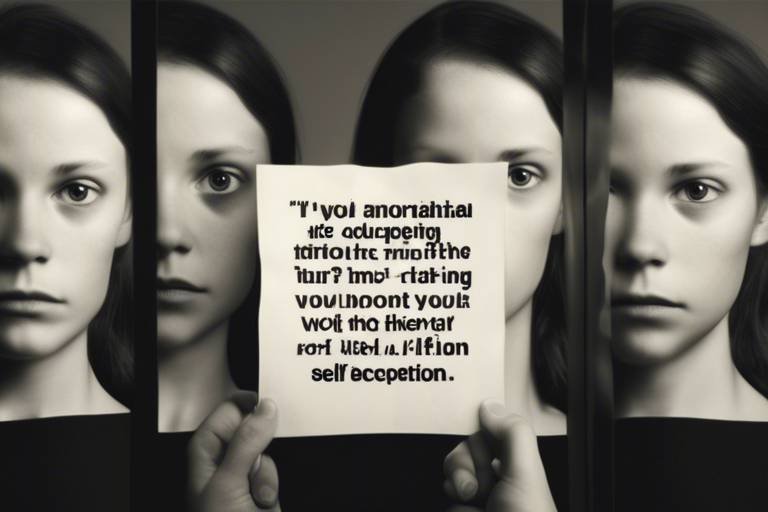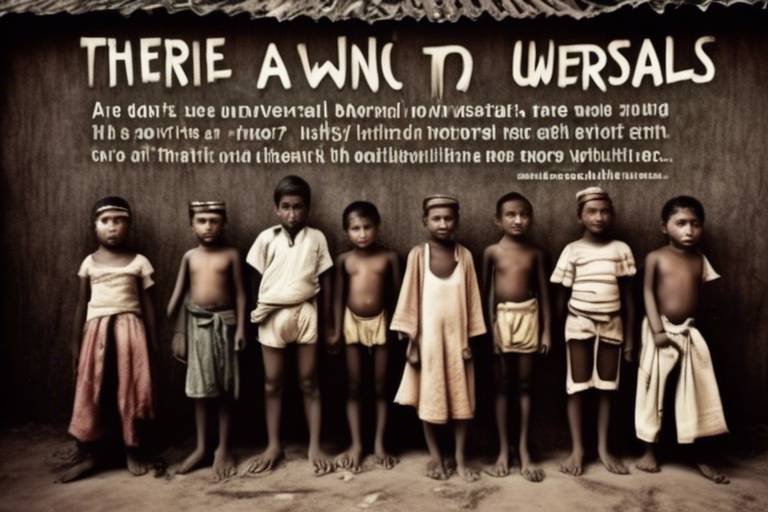Can Religion and Science Agree on Ethics and Morality?
The relationship between religion and science has been a topic of intense debate for centuries. On one hand, religion offers a framework for understanding morality, often grounded in ancient texts and spiritual beliefs. On the other, science provides a systematic approach to understanding human behavior and the natural world. So, can these two seemingly disparate domains find common ground when it comes to ethics and morality? This question not only invites exploration but also challenges us to reflect on our own beliefs and the principles that guide our actions.
To grasp this complex relationship, we must first consider the historical context. Throughout history, religion and science have both clashed and collaborated. From the infamous trials of Galileo to the modern debates surrounding climate change, the tension between faith and empirical evidence has shaped societal views on what is deemed ethical or moral. For instance, while religious doctrines may advocate for stewardship of the Earth, scientific findings about climate change provide a stark warning about the consequences of neglecting such responsibilities. This intersection raises the question: can religious teachings adapt in light of scientific discoveries, or are they destined to remain in conflict?
At the core of many religious teachings are fundamental ethical principles that guide followers in discerning right from wrong. These principles often emphasize values such as compassion, honesty, and justice. For example, Christianity promotes the idea of loving one’s neighbor, while Buddhism teaches the importance of compassion for all living beings. These moral tenets not only influence individual behavior but also shape societal norms. However, can these principles withstand the scrutiny of scientific inquiry? As we delve deeper into this topic, we must also consider how science approaches morality.
Science, particularly through fields like psychology and biology, provides valuable insights into human behavior and decision-making. By studying the brain and social dynamics, scientists can uncover patterns that inform our understanding of moral reasoning. For instance, research has shown that empathy plays a crucial role in ethical decision-making. This raises an intriguing possibility: could scientific findings enhance our understanding of religious morals, leading to a more nuanced perspective on ethics?
Interestingly, there are areas where religion and science converge, particularly in addressing pressing ethical issues. For example, both domains often advocate for the welfare of others, whether through religious teachings on charity or scientific research on public health. This common ground suggests that rather than being at odds, religion and science can collaborate to promote ethical behavior and societal well-being. However, this harmony is not without its challenges.
Conflicts between religious beliefs and scientific findings are not uncommon. Issues such as evolution and bioethics often ignite passionate debates. For example, the controversy surrounding the teaching of evolution in schools pits scientific understanding against certain religious interpretations of creation. Similarly, discussions around topics like stem cell research and genetic engineering highlight the ethical dilemmas that arise when scientific advancements challenge traditional moral frameworks. These conflicts not only complicate the dialogue between religion and science but also raise important questions about the nature of morality itself.
In contrast, secular ethics offers an alternative perspective, independent of religious doctrine. This framework draws upon human reason and shared values to establish moral guidelines. In a diverse society, secular ethics can play a crucial role in fostering inclusive discussions about morality, allowing individuals from various backgrounds to engage in ethical discourse without the constraints of religious beliefs. As we navigate the complexities of modern life, the relevance of secular ethics becomes increasingly apparent.
Cultural context also plays a significant role in shaping both religious and scientific approaches to ethics. Different cultures interpret moral principles in unique ways, influenced by historical, social, and environmental factors. For instance, the concept of justice may vary widely across cultures, leading to diverse ethical standards. This cultural lens invites us to consider the global implications of our moral frameworks and how they can be harmonized to address universal challenges.
Looking ahead, the future of ethics may lie in the integration of religious and scientific perspectives. As our understanding of morality evolves, there is potential for collaboration that fosters a more holistic view of ethics. By embracing both faith-based and empirical approaches, we can cultivate a richer dialogue that respects diverse beliefs while also acknowledging the insights offered by science. This integration could pave the way for innovative solutions to ethical dilemmas we face in an increasingly complex world.
- Can science prove or disprove religious beliefs? Science and religion often operate in different realms; while science focuses on empirical evidence, religion addresses spiritual and existential questions.
- How can secular ethics coexist with religious morals? Secular ethics can provide a common ground for moral discussions, allowing individuals from diverse backgrounds to engage in ethical reasoning.
- What role does culture play in shaping ethics? Culture significantly influences how moral principles are interpreted and applied, leading to a variety of ethical standards globally.
- Is it possible for religion and science to collaborate on ethical issues? Yes, there are many areas where religion and science can work together, particularly in promoting social welfare and addressing global challenges.

The Historical Context of Religion and Science
Throughout history, the relationship between religion and science has been anything but straightforward. From the ancient civilizations that revered the cosmos as divine to the Enlightenment thinkers who sought to unravel the mysteries of the universe through observation and reason, the interplay between these two domains has shaped our understanding of ethics and morality in profound ways. It’s fascinating to consider how these fields, often viewed as opposing forces, have evolved together over centuries.
In the early days, religion provided the primary framework for understanding the world. The ancient Greeks, for instance, attributed natural phenomena to the actions of gods. However, as societies progressed, figures like Galileo Galilei and Isaac Newton began to challenge the status quo. They introduced a scientific method based on observation and experimentation, which eventually led to significant advancements in various fields, including astronomy and physics. This shift marked a pivotal moment in history, where empirical evidence started to take precedence over religious dogma.
However, this newfound reliance on science did not mean that religion lost its influence. Instead, it sparked a series of conflicts and debates. The trial of Galileo in the 17th century is a prime example, where his support for the heliocentric model of the solar system put him at odds with the Catholic Church. Such events highlight the tension that can arise when scientific discoveries challenge long-held religious beliefs. Yet, it’s essential to recognize that not all religious perspectives rejected science. Many religious scholars embraced scientific inquiry, seeing it as a way to understand the divine creation better.
As we moved into the 19th century, the emergence of evolutionary theory further complicated the relationship between religion and science. The publication of Charles Darwin's "On the Origin of Species" ignited fierce debates about the origins of life and humanity's place in the universe. This period marked a significant turning point, where scientific explanations began to provide alternative narratives to traditional religious stories of creation.
Fast forward to the present day, and we find ourselves in a world where both religion and science continue to play crucial roles in shaping our ethical frameworks. While there are still notable conflicts—such as those surrounding climate change and bioethics—there are also areas of collaboration. The historical context of their relationship reveals a complex tapestry of conflict, cooperation, and evolution, prompting us to question whether these two domains can indeed find common ground in addressing moral questions.
In summary, the historical context of religion and science is a rich and intricate narrative. It reminds us that while they may often seem at odds, both have significantly contributed to our understanding of ethics and morality. Their interactions have shaped societal views and continue to influence contemporary discussions on what it means to live a moral life.
- Can religion and science coexist peacefully? Yes, many individuals and communities find ways to harmonize their religious beliefs with scientific understanding.
- What are some examples of conflicts between religion and science? Notable examples include the debates over evolution and climate change, where scientific findings often clash with certain religious interpretations.
- How have historical events shaped the relationship between religion and science? Events like the trial of Galileo and the publication of Darwin's theories have significantly influenced public perception and the dialogue between these two fields.

Fundamental Ethical Principles in Religion
When we talk about ethics and morality in the context of religion, we're diving into a deep well of beliefs, traditions, and teachings that have shaped human behavior for centuries. Religious ethical principles serve as a guiding light for millions around the globe, influencing their decisions and interactions with others. At the heart of these principles often lies a quest for what is considered 'right' or 'wrong,' and this quest can vary dramatically across different faiths.
For instance, many religions advocate for the idea of compassion and kindness as fundamental virtues. In Christianity, the concept of "loving thy neighbor" is a cornerstone of moral teaching, encouraging believers to act with empathy and understanding. Similarly, in Buddhism, the principle of metta, or loving-kindness, emphasizes the importance of goodwill towards all beings. These tenets not only promote harmony but also foster a sense of community among followers.
Moreover, the principle of justice is another crucial aspect of religious ethics. Most religions convey the importance of fairness and accountability. For example, Islam teaches the concept of adl, which translates to justice, urging its followers to act equitably in all dealings. This principle is echoed in Judaism through the concept of Tikkun Olam, or "repairing the world," which emphasizes social justice and responsibility.
In addition to compassion and justice, the idea of honesty is universally upheld across various religions. The Ten Commandments in Christianity and Judaism include directives against lying and bearing false witness, while in Hinduism, the principle of satyam emphasizes truthfulness as a vital component of righteous living. These ethical guidelines help to cultivate trust and integrity within communities.
Furthermore, many religious traditions incorporate the notion of selflessness and service to others. For instance, Sikhism promotes the concept of seva, or selfless service, encouraging individuals to contribute positively to their communities without expecting anything in return. This principle not only enhances individual character but also strengthens societal bonds.
In summary, while the specific ethical principles may differ from one religion to another, the underlying themes of compassion, justice, honesty, and selflessness resonate across many faiths. These principles provide a moral framework that guides adherents in their daily lives, shaping their interactions and decisions. As we explore the intersection of religion and science in ethics, it becomes evident that these foundational beliefs play a crucial role in understanding human morality.
- What are the main ethical principles found in religions? Most religions emphasize compassion, justice, honesty, and selflessness as core ethical principles.
- How do religious ethical principles influence behavior? They provide a moral framework that guides decision-making and interactions with others.
- Are there common ethical principles shared across different religions? Yes, many religions share similar themes, such as compassion and justice, despite differing specific teachings.

Scientific Perspectives on Morality
When we think about morality, we often picture it as a realm dominated by religious teachings or philosophical musings. However, science offers a fascinating lens through which we can examine moral behavior and ethical decision-making. In recent years, fields like psychology, neuroscience, and evolutionary biology have begun to peel back the layers of our moral compass, revealing not just what we believe is right or wrong, but why we believe it. Have you ever wondered why we feel compelled to help others, even at a cost to ourselves? Or why some cultures prioritize communal well-being over individual rights? These questions lie at the heart of scientific inquiry into morality.
One of the most compelling insights from psychology is the concept of empathy. Studies have shown that our capacity to empathize with others is a significant driver of moral behavior. For instance, when we see someone in distress, our brain activates areas associated with emotional response, prompting us to act. This natural inclination toward empathy can be traced back to our evolutionary history; as social creatures, humans have thrived in cooperative groups. Thus, moral behaviors like altruism can be understood not just as social constructs but as evolutionary adaptations that enhance our survival.
Moreover, neuroscience has made strides in understanding how our brains process moral decisions. Research using brain imaging technology has revealed that different types of moral dilemmas activate distinct neural pathways. For example, when faced with a moral quandary, our brain weighs emotional responses against rational calculations, often leading to conflicting feelings. This tug-of-war within our minds illustrates that morality is not merely a matter of personal belief but is deeply rooted in our biological makeup.
Additionally, the field of evolutionary psychology posits that our moral instincts have been shaped by the pressures of natural selection. According to this perspective, traits like fairness and cooperation have been favored because they promote group cohesion and ultimately enhance reproductive success. To illustrate this, consider the following table that summarizes key findings in evolutionary psychology regarding moral behavior:
| Trait | Evolutionary Advantage |
|---|---|
| Altruism | Strengthens group bonds, increases survival rates |
| Fairness | Promotes cooperation, reduces conflict |
| Empathy | Facilitates social connections, enhances group cohesion |
While science provides valuable insights into the mechanics of morality, it also raises important questions about the implications of these findings. If our moral instincts are biologically rooted, does that mean that morality is simply a product of our brain chemistry? Or can we still hold individuals accountable for their actions? These questions challenge us to think critically about the nature of morality and the role of free will.
Furthermore, scientific perspectives on morality are not without their controversies. For instance, some argue that relying solely on scientific explanations can lead to a form of moral relativism, where ethical standards become subjective and fluid. This raises the question: can we find a balance between scientific understanding and the moral frameworks provided by religion or philosophy? The answer may lie in recognizing that while science can inform our understanding of morality, it does not dictate our ethical beliefs.
In conclusion, the intersection of science and morality offers a rich tapestry of insights that challenge traditional views. By examining moral behavior through the lenses of psychology, neuroscience, and evolutionary biology, we can gain a deeper understanding of what drives our ethical decisions. As we continue to explore these scientific perspectives, we must remain open to the possibility that our moral landscape is shaped by both our biology and our cultural context. So, how do you think science and religion can collaborate to enrich our understanding of ethics?
- Can science provide a definitive answer to moral questions?
While science offers insights into human behavior, moral questions often involve subjective values that science alone cannot resolve. - How does empathy relate to moral behavior?
Empathy is a key driver of moral behavior, prompting individuals to act in ways that benefit others. - Is morality purely a biological phenomenon?
No, while biology plays a significant role, cultural, social, and philosophical factors also shape our moral beliefs.

Common Ground: Where Religion Meets Science
When we think about the age-old debate between religion and science, it’s easy to picture two opposing forces locked in a battle of wills. However, there are surprising areas where these two realms not only coexist but also collaborate to address ethical questions that affect our daily lives. Imagine a bridge, connecting two seemingly distant lands—this is what common ground looks like in the context of ethics and morality.
One of the most compelling intersections of religion and science can be found in the realm of environmental ethics. Many religious traditions emphasize the stewardship of the Earth, urging their followers to care for creation. For instance, in Christianity, the concept of being a steward of God’s creation is deeply rooted in biblical teachings. Similarly, various indigenous religions hold sacred views of nature, advocating for its protection. On the scientific side, research highlights the urgent need for sustainable practices to combat climate change and preserve biodiversity. Here, both perspectives align, creating a powerful narrative that calls for ethical action.
Moreover, consider the field of bioethics, which often finds itself at the crossroads of religious beliefs and scientific advancements. Issues such as genetic engineering, stem cell research, and end-of-life decisions provoke profound moral questions. Religious organizations often contribute to the dialogue, providing ethical frameworks that guide scientific inquiry. For example, many faith-based groups advocate for the responsible use of technology, emphasizing the importance of human dignity and the sanctity of life. This collaboration can lead to more comprehensive policies that respect both scientific progress and ethical considerations.
Interestingly, both religion and science share a common goal: the pursuit of truth. While their methodologies may differ—faith often relies on spiritual insights, while science leans on empirical evidence—the underlying quest for understanding the human condition is strikingly similar. This pursuit can manifest in various ways, such as:
- Interfaith dialogues that incorporate scientific findings to enrich moral discussions.
- Collaborative research initiatives that include ethical perspectives from religious leaders.
- Community programs that blend scientific literacy with moral teachings to foster responsible citizenship.
As we explore these intersections, it’s essential to recognize that the conversation between religion and science is not merely about finding agreement; it’s about enriching our ethical frameworks. By engaging in open dialogue, both domains can learn from each other, fostering a more nuanced understanding of morality. This enriched perspective can lead to innovative solutions to pressing global issues, such as poverty, healthcare, and environmental degradation.
In conclusion, while the traditional view might frame religion and science as adversaries, the reality is far more complex. Their common ground provides fertile soil for ethical discussions that can guide humanity toward a more compassionate and just world. As we continue to navigate the challenges of modern life, embracing the insights from both realms could prove invaluable in shaping a future where ethics are informed by a diverse array of perspectives.
1. Can religion and science coexist peacefully?
Yes, there are many areas where religion and science can coexist, particularly in ethical discussions where both perspectives can contribute valuable insights.
2. How can religious teachings inform scientific ethics?
Religious teachings often provide foundational moral principles that can guide scientific practices, ensuring they align with ethical standards that respect human dignity and the environment.
3. Are there examples of collaboration between religion and science?
Yes, initiatives in environmental stewardship and bioethics often see collaboration between religious organizations and scientific communities, working together to address complex moral issues.
4. What role does cultural context play in the relationship between religion and science?
Cultural context significantly influences how both religion and science approach ethics, shaping interpretations and applications of moral principles across different societies.

Conflicts Between Religious and Scientific Ethics
When we think about the clash between religion and science, it's almost like watching a dramatic play unfold on stage. Each side has its own script, its own set of characters, and a storyline that often seems irreconcilable. The tension between these two domains can lead to heated debates and passionate arguments, especially when it comes to ethical issues. So, what are some of the key conflicts that arise?
One of the most notable areas of contention is the theory of evolution. For many religious groups, the idea that humans evolved from other species can be at odds with the belief that humans were created in a specific way by a divine being. This clash has led to significant educational debates, particularly in the United States, where some states have attempted to introduce laws that favor creationism over evolutionary biology in school curricula. The conflict here is not just about science; it touches on deeply held beliefs about our origins and place in the universe.
Another hot-button issue is climate change. While the scientific community overwhelmingly agrees on the human impact on climate, some religious groups interpret their scriptures in ways that lead them to dismiss scientific findings. They may believe that the Earth is a divine creation that will endure regardless of human actions, leading to a reluctance to engage in environmental stewardship. This disconnect can create a significant barrier to collective action on pressing global issues.
Moreover, bioethics presents another battlefield where religious and scientific ethics often collide. Topics such as abortion, stem cell research, and euthanasia spark fierce debates. Many religious traditions hold strong beliefs about the sanctity of life, which can conflict with scientific perspectives that advocate for individual autonomy and the potential benefits of medical advancements. These ethical dilemmas force society to grapple with questions like: What is the value of life? Who gets to decide the fate of an individual in medical distress?
To illustrate the complexity of these conflicts, consider the following table that summarizes some key areas of disagreement:
| Issue | Religious Perspective | Scientific Perspective |
|---|---|---|
| Evolution | Creationism; belief in divine creation | Natural selection; species evolve over time |
| Climate Change | Some view Earth as divinely protected | Human activity is a primary cause of climate change |
| Bioethics | Sanctity of life; often oppose abortion and euthanasia | Focus on autonomy and potential benefits of medical research |
In these conflicts, the stakes are high. The implications of choosing one ethical framework over another can affect policy decisions, educational systems, and even personal lives. As such, it's essential to approach these discussions with a spirit of understanding and an open mind. Can we find a way to respect both perspectives, or are we destined to remain at odds forever?
Ultimately, the conflicts between religious and scientific ethics highlight the need for dialogue. It's not about choosing one side over the other, but rather about finding common ground. After all, both realms seek to answer fundamental questions about the human experience, albeit from different angles. Perhaps, in the end, the goal should be to foster a conversation that acknowledges these differences while also exploring the potential for collaboration.
- What are some examples of conflicts between religion and science?
Some key examples include the debate over evolution vs. creationism, differing views on climate change, and ethical dilemmas surrounding bioethics such as abortion and euthanasia.
- Can religion and science coexist?
Yes, many believe that religion and science can coexist and even complement each other by providing different perspectives on ethical issues.
- How do cultural contexts influence these conflicts?
Cultural backgrounds can shape how individuals interpret both religious texts and scientific findings, leading to varied responses to ethical questions.

The Role of Secular Ethics
In our diverse and multifaceted society, secular ethics plays a pivotal role in shaping moral frameworks that are independent of religious doctrines. Unlike religious ethics, which are often rooted in divine commandments and sacred texts, secular ethics relies on human reason, experience, and the collective understanding of what constitutes a good and just society. This approach to morality is particularly significant in an increasingly pluralistic world where individuals from various backgrounds coexist, each bringing their own values and beliefs to the table.
One of the most compelling aspects of secular ethics is its foundation in humanism. This philosophical stance emphasizes the intrinsic value of human beings and advocates for the welfare and dignity of all individuals, regardless of their religious affiliations. By prioritizing human well-being, secular ethics encourages us to consider the consequences of our actions on others, fostering a sense of responsibility that transcends religious boundaries. For instance, when we confront ethical dilemmas such as environmental sustainability or social justice, secular ethics provides a platform for dialogue that is inclusive and accessible to everyone, irrespective of their faith.
Moreover, secular ethics often employs a utilitarian approach, which seeks to maximize overall happiness and minimize suffering. This principle can be seen in various contemporary ethical discussions, such as debates around healthcare, education, and public policy. By focusing on outcomes rather than divine mandates, secular ethics invites a pragmatic examination of moral issues. For example, when considering the ethics of medical interventions, a secular perspective might prioritize the greatest good for the greatest number, thereby aligning moral reasoning with empirical evidence and societal needs.
However, it's essential to recognize that secular ethics is not without its challenges. Critics often argue that without a religious foundation, moral principles may become subjective and variable. To address this concern, many secular ethicists advocate for a framework that incorporates reasoned debate, consensus-building, and an appeal to shared human experiences. This method not only strengthens the legitimacy of secular ethics but also fosters a sense of community and mutual respect among individuals of differing beliefs.
To illustrate the impact of secular ethics, consider the following table that outlines some key differences between religious and secular ethical frameworks:
| Aspect | Religious Ethics | Secular Ethics |
|---|---|---|
| Foundation | Divine commandments, sacred texts | Human reason, experience, and collective understanding |
| Focus | Obedience to divine will | Consequences of actions on human welfare |
| Universality | Specific to religious beliefs | Inclusive of diverse perspectives |
| Flexibility | Often rigid and unchanging | Adaptable to new information and societal changes |
In conclusion, secular ethics provides a vital alternative to religious moral frameworks, allowing for a more inclusive and adaptable approach to ethical reasoning. By emphasizing human well-being and the importance of collective discourse, secular ethics not only enriches our understanding of morality but also encourages collaboration among individuals from various backgrounds. As we navigate the complexities of modern life, the role of secular ethics will undoubtedly continue to evolve, fostering a more harmonious society built on shared values and mutual respect.
- What is secular ethics? Secular ethics refers to moral principles that are based on human reason and experience rather than religious beliefs.
- How does secular ethics differ from religious ethics? Secular ethics focuses on the consequences of actions on human welfare, while religious ethics often relies on divine commandments.
- Can secular ethics be universally applicable? Yes, secular ethics aims to be inclusive and adaptable, allowing for diverse perspectives and shared human experiences.
- What role does humanism play in secular ethics? Humanism emphasizes the intrinsic value of human beings and promotes the welfare and dignity of all individuals.

The Impact of Cultural Context on Ethics
The interplay between cultural context and ethics is a fascinating dance that shapes our understanding of morality across different societies. Imagine ethics as a vibrant tapestry, woven from the threads of culture, religion, and personal experiences. Each culture brings its own unique colors and patterns to this tapestry, influencing how individuals perceive right and wrong. For instance, what is considered ethical in one culture may be viewed as taboo in another. This divergence raises a crucial question: How do cultural backgrounds shape our moral frameworks?
To illustrate this point, let's consider some examples. In many Western cultures, individualism is highly valued, leading to ethical principles that emphasize personal rights and freedoms. On the other hand, collectivist cultures, such as those found in parts of Asia, often prioritize community well-being over individual desires. This fundamental difference can create tension when discussing issues like human rights or environmental responsibilities. In a globalized world, these contrasting views can lead to misunderstandings and ethical dilemmas that challenge our ability to find common ground.
Moreover, cultural narratives and traditions play a significant role in shaping ethical beliefs. For instance, indigenous cultures often have deep-rooted connections to the land, which informs their ethical stance on environmental conservation. In contrast, industrialized cultures may prioritize economic growth, sometimes at the expense of ecological considerations. Such differences highlight how cultural context can lead to varying interpretations of ethical responsibilities, especially when addressing global challenges like climate change.
It's also essential to recognize that cultural context is not static; it evolves over time. As societies become more interconnected, ethical perspectives can shift. Take, for example, the growing acceptance of LGBTQ+ rights in many parts of the world. This shift reflects a broader cultural change that challenges traditional views and prompts a reevaluation of moral principles. Thus, the dynamic nature of culture means that ethical standards are continually in flux, adapting to new influences and ideas.
In light of these complexities, it becomes evident that understanding ethics requires a nuanced appreciation of cultural contexts. By engaging with diverse perspectives, we can enrich our moral discourse and foster a more inclusive approach to ethics. Ultimately, the question remains: Can we bridge the gaps between these cultural differences to create a more unified ethical framework that respects individual beliefs while promoting global harmony?
- How does culture influence moral decision-making?
Cultural norms and values significantly shape how individuals perceive right and wrong, affecting their moral choices. - Can ethical principles be universal across cultures?
While some ethical principles may resonate globally, many are deeply rooted in cultural contexts, making universal agreement challenging. - What role does education play in shaping cultural ethics?
Education can help individuals critically analyze their cultural beliefs and adapt their ethical perspectives in response to new information.

The Future of Ethics: Integrating Religion and Science
As we look to the future, the integration of religion and science in shaping our ethical frameworks presents a fascinating landscape. Imagine a world where the profound insights of scientific inquiry harmoniously blend with the moral compass provided by religious teachings. This synthesis could lead to a more comprehensive understanding of ethics, one that is deeply rooted in both empirical evidence and spiritual wisdom.
One of the most exciting prospects of this integration is the potential for enhanced moral reasoning. By combining the analytical tools of science with the rich narratives of religion, individuals and societies could develop a more nuanced approach to ethical dilemmas. For instance, consider the issue of climate change. Scientific research provides data on environmental impacts, while religious teachings often emphasize stewardship of the Earth. Together, they can inspire a collective commitment to sustainable practices, fostering a sense of responsibility that transcends individual beliefs.
Furthermore, the dialogue between religion and science can lead to innovative solutions to pressing global challenges. Take healthcare, for example; scientific advancements in medicine can be complemented by ethical considerations rooted in religious values. This collaboration could pave the way for more compassionate healthcare policies that respect both the dignity of individuals and the scientific realities of treatment options.
However, this journey toward integration is not without its challenges. There are deeply entrenched beliefs on both sides that can create barriers to open dialogue. To bridge these gaps, it is essential to foster an environment of mutual respect, where questions are welcomed, and diverse perspectives are valued. Engaging in conversations that highlight shared values can help dismantle misconceptions and promote understanding.
Moreover, as society becomes increasingly diverse, the integration of secular ethics into this dialogue is crucial. Secular ethics, grounded in reason and human experience, can provide a common platform for individuals from various backgrounds to engage in ethical discussions. This inclusivity can enrich the conversation, allowing for a broader spectrum of ideas and solutions.
In conclusion, the future of ethics lies in our ability to integrate the insights of both religion and science. By fostering collaboration and understanding, we can create a moral framework that is not only comprehensive but also adaptable to the complexities of modern life. As we navigate this path, let’s remain open to the possibilities that arise when faith meets reason, and together, we can strive for a more ethical and compassionate world.
- Can religion and science truly coexist in ethical discussions? Yes, by focusing on shared values and mutual respect, both can contribute valuable perspectives.
- What role does secular ethics play in this integration? Secular ethics provides a common ground for diverse individuals to engage in moral discussions without religious bias.
- How can we encourage dialogue between religious and scientific communities? By promoting open discussions, educational initiatives, and collaborative projects that highlight shared goals.
Frequently Asked Questions
- Can religion and science coexist in discussions about ethics?
Absolutely! While religion and science may approach ethics from different angles, they can find common ground. Many religious individuals embrace scientific findings, using them to enrich their moral understanding. Conversely, some scientific perspectives can align with ethical teachings from various religions, creating a dialogue that enhances both fields.
- What are some key ethical principles found in major religions?
Most religions share fundamental ethical principles such as compassion, honesty, and justice. For instance, Christianity emphasizes love and forgiveness, while Buddhism promotes the concept of compassion for all beings. Understanding these principles can help bridge gaps between differing moral frameworks.
- How does science contribute to our understanding of morality?
Science, particularly through psychology and biology, offers insights into human behavior and decision-making processes. By studying how people think and act, scientists can reveal patterns in moral reasoning, helping us understand why we make certain ethical choices. This scientific approach can complement religious teachings by providing a more nuanced view of human morality.
- What are some examples of conflicts between religious beliefs and scientific findings?
Conflicts often arise in areas like evolution, where scientific evidence challenges literal interpretations of religious texts. Other examples include debates over climate change, where some religious groups may resist scientific consensus. These tensions highlight the need for open dialogue and understanding between the two domains.
- What role does secular ethics play in moral discussions?
Secular ethics offers a framework for morality that is independent of religious doctrine, focusing instead on human reason and shared human experiences. This perspective is particularly relevant in diverse societies, as it allows for moral discussions that include a variety of viewpoints, fostering inclusivity and mutual respect.
- How do cultural contexts influence ethical perspectives?
Cultural backgrounds significantly shape how both religious and scientific ethics are interpreted. Different societies may prioritize various moral principles based on their unique histories, traditions, and challenges. This cultural lens can lead to diverse understandings of what is considered ethical or moral, impacting global discussions on these topics.
- What does the future hold for the relationship between religion and science in ethics?
The future may see a more integrated approach, where religious and scientific perspectives collaborate to address ethical dilemmas. As society evolves, there may be greater recognition of the value each domain brings to moral reasoning, potentially leading to a more holistic understanding of ethics that benefits everyone.



















